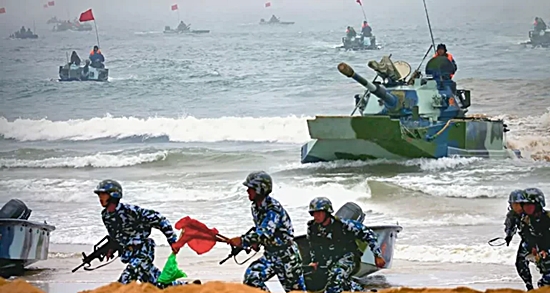
War gaming suggests that if the United States tries to defend a China-attacked Taiwan “with the current force structure,” it may lose more than 900 aircraft as well as a big chunk of the U.S. Navy’s surface fleet.
“It may not be all this bad,” suggests James Roth in his latest column for StopTheChinazis.org, about the respective naval capacities of the United States and China. For “the U.S. would not be fighting China alone. But which allies would join the effort and with what naval assets is uncertain.”
A just-released CSIS Brief, “Building International Support for Taiwan,” discusses what strategy we should follow if we want a strong coalition to help protect Taiwan from China. (CSIS is the Center for Strategic & International Studies. “We” is the United States government.) The brief “distills key insights” of members of a task force who met several times in 2023.
Overly militaristic framing?
The paper does not get off to the best possible start when it declares in its inaugural section, The Issue, that “Washington will need a compelling narrative [about] why Taiwan matters that instills urgency across a wide range of capitals—and avoids limiting engagement through overly militaristic framings of the challenge.”
What would be an “overly militaristic” framing of a challenge that consists of China’s nonstop military threatening of Taiwan? In the next section, the Introduction, we are told that “overly militaristic framings about cross-Strait issues and Taiwan’s future have the unanticipated consequence of constraining the space for actual and potential coalition partners to engage on the issue.”
“Constraining the space to engage” how? Maybe some of the countries don’t like to hear about guns and battleships and things?
The job is urgent, for, say the authors, “any conflict in the Taiwan Strait would also quickly spread across the globe and into cyberspace and space. There would also be real risk of a nuclear exchange. If China uses force to assert control over Taiwan and its 24 million residents, it would mark the definitive end of the post-World War II international system and usher in a ‘might-makes-right’ world in its place.”
Although at least free of jargon, this is another imperfect formulation. Not imperfect in its prediction that a Chinese conquest of Taiwan would have disastrous consequences globally, it surely would, but in its suggestion that the 80 years since the end of World War II have been substantially free of conquest and specifically of conquests or attempted conquests by China. The peoples of Xinjiang, Tibet, Hong Kong, and Taiwan itself, for a start, might disagree. It is true that China has latterly often favored coercively nibbling at the edges of the sovereignty of other countries rather than immediately launching major wars against them.
Getting the buy-in
The authors list the key findings of the task force:
● Appealing to “specific interests, rather than democratic solidarity” is more likely to “drive engagement” with Taiwan in much of the world. This is the best way to expand “stakeholder buy-in.”
● Washington must persuade the world of how crucial Taiwan is to regional stability and global prosperity. The more effectively the U.S. government makes this case, “the more invested other stakeholders will be in its security.”
● Talk about how a PRC war with Taiwan would threaten stability; don’t talk about Taiwan’s sovereignty. The latter has an injurious effect on the stakeholder buy-in.
● “Greater clarity on the ultimate and proximate causes of rising tensions in the Taiwan Strait is needed to combat Beijing’s narrative that the United States is solely responsible for ‘stirring the pot.’ ”
Yes, the lies of the Chinese Communist Party must be countered to help us get the stakeholder buy-in. But the CCP does not argue, or at least not all the time, that the U.S. is solely responsible for stirring trouble vis-à-vis the relationship between China and Taiwan. China certainly blames the current government of Taiwan and its supporters quite often. And greater clarity about how silly this propaganda is would have to mention, at some point, the fact that Taiwan is a country. It’s nothing to be ashamed of. Lots of countries are countries.
● “In the long term, U.S. consistency and steadiness regarding Taiwan will be an important foundation for generating greater global buy-in. Conversely, prevarication, inconsistency, and the abandonment of the longstanding ‘One China’ policy will cast a chill on allied coordination on Taiwan.”
How is sticking to the studied ambiguity and lies of the “longstanding ‘One China’ policy” (thanks Nixon and Carter) consistent with “greater clarity on the ultimate and proximate causes of rising tensions in the Taiwan Strait” and with eschewing prevarication and inconsistency? Is stakeholder buy-in okay with some lies but not others?
● “Relatedly, overly militaristic framings about cross-Strait issues and Taiwan’s future have the unanticipated consequence of constraining the space for actual and potential coalition partners to engage on the issue.”
Let’s have clarity
Once these prospective partners have been enlisted in a coalition by way of steering clear of “overly militaristic framings,” what would they be doing or committing themselves to do to help prevent or oppose a Chinese attack on Taiwan? At some point the word “military” will have to be uttered at least once. If not, the nature of the “stakeholder buy-in” will be unclear.
The paper next presents six “takeaways” that further elaborate the gist of the task force’s conclusions. This section ends by saying that “task force members observed that the existence of these debates [about the relationship of the U.S. to Taiwan] will generate an impulse toward caution in foreign capitals on matters related to Taiwan until there is greater clarity on the direction of U.S. policy following the 2024 election.”
American foreign policy should be clearer. But the debates about its direction aren’t going to end, ever; moreover, every four years, we hope, we have yet another presidential election. Let not the foreign capitals wait for perfect unity and clarity on this end before befriending and concretely helping Taiwan themselves.





